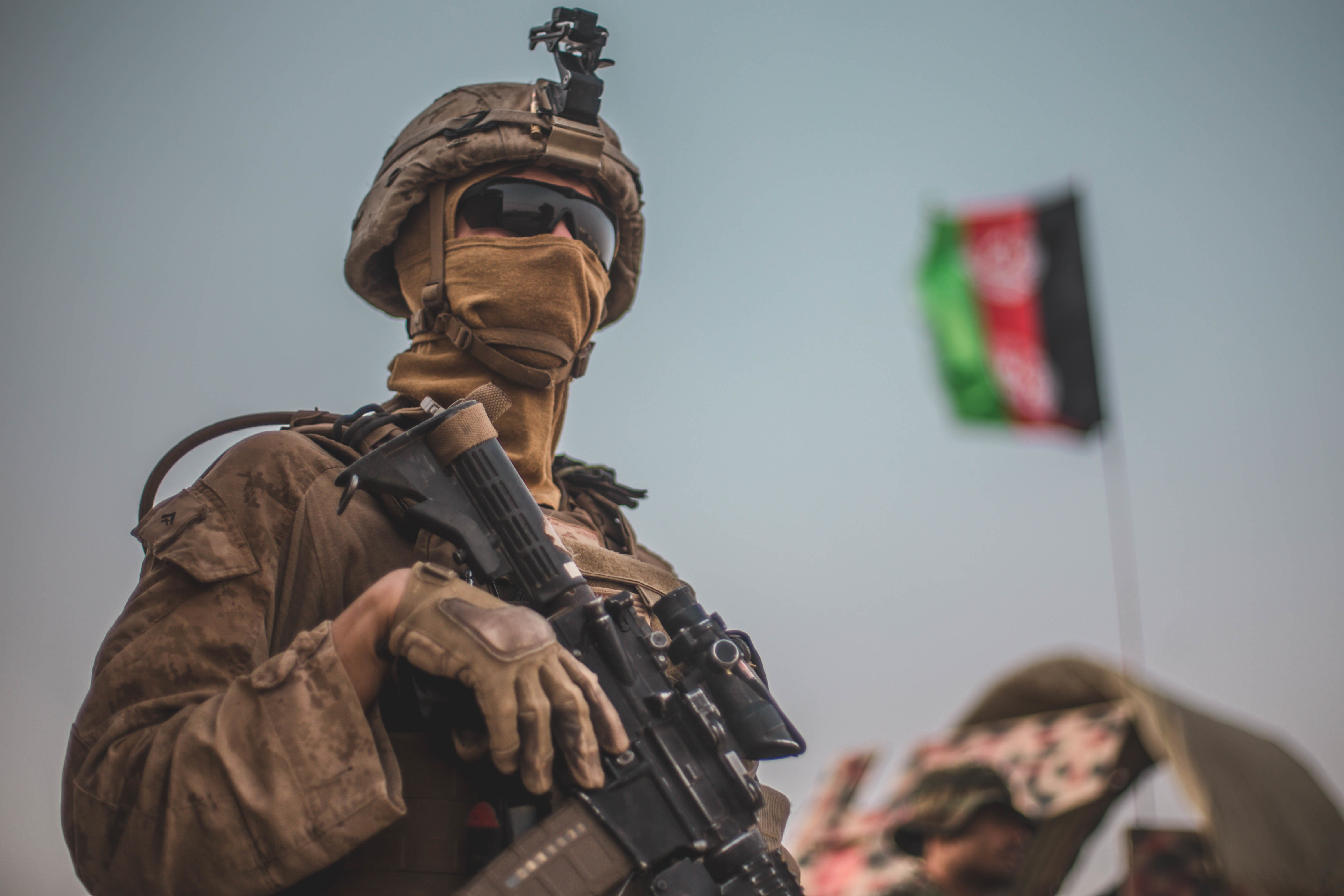
The Pentagon is sending 3,000 troops – including two Marine Corps battalions – to Afghanistan to support the evacuation of the U.S. embassy in Kabul.
The Defense Department is sending three infantry battalions, one from the Army and two from the Marine Corps, to help with the evacuation, Pentagon spokesperson John Kirby told reporters today.
“They will move to Hamid Karzai International Airport in Kabul within the next 24 to 48 hours,” Kirby said.
Kirby declined to specify where the three battalions are coming from, but said they are currently within U.S. Central Command. The 24th Marine Expeditionary Unit (MEU) is currently deployed with the Iwo Jima Amphibious Ready Group, which is in the Gulf of Oman, according to the Aug. 9 USNI News Fleet Tracker.
Kirby, who described the effort as a “temporary mission with a narrow focus,” said the Pentagon is also sending about 1,000 personnel from the Air Force and Army to Qatar to handle Afghan visas.
“The next movement will consist of a joint U.S. Army/Air Force support element of around a thousand personnel to facilitate the processing of [special immigrant visa] applicants. Initial elements of this movement of this element will arrive in Qatar in the coming days,” Kirby told reporters. “The third movement is to alert and to deploy one infantry brigade combat team out of Fort Bragg to Kuwait, where they will be postured and prepared if needed to provide additional security at the airport. We anticipate those forces will reach Kuwait sometime within the next week.”
The movements come amid reports that the Taliban has taken several cities within Afghanistan as the U.S. continues its withdrawal from the nearly 20-year war in the country. Reports on Thursday said the Taliban had taken both the cities of Ghazni and Herat, while a report from The New York Times cited American officials saying the Taliban could take Kabul within a month.
Kirby said the Pentagon does not consider the movements a noncombatant evacuation operation, or NEO.
“The purpose here is to help with the reduction of civilian personnel out of the embassy. That is not the same as a noncombatant evacuation operation, where you’re moving a massive amount of people who aren’t necessarily U.S. government employees. it’s a different operation altogether and we’re just not there,” Kirby said when asked why the effort is not considered a NEO. “The other thing that we’re going to be doing is helping the State Department, again, accelerate the process for special immigrant visa applicants. That also does not fall under the rubric of what would be a noncombatant evacuation operation.”
The Ronald Reagan Carrier Strike Group, the Navy’s Japan-based CSG, has been in the Middle East since June to help support the Afghanistan withdrawal, USNI News previously reported. Kirby said the military expects the withdrawal to require more airlift.
“We do anticipate an increased need for U.S. airlift and the secretary has already had conversations with the chairman and with [U.S.] Transportation Command about these potential needs, so we do fully expect that there’ll be additional United States military airlift required,” Kirby said today. “I just don’t have the details here today for you exactly what that’s going to look like, how many tails, and what the sorties are going to look like. But we absolutely anticipate being more involved in the airlift element of this mission.”
Despite sending additional troops for the evacuation, Kirby said the U.S. is still on schedule to conclude its withdrawal by the end of August. Earlier this summer President Joe Biden set Aug. 31 as the withdrawal deadline.
Lawmakers were quick to respond to the Pentagon’s plans on Thursday.
“The reduction of our Embassy staff in and the relocation of the Embassy from Kabul is a pragmatic step given the ongoing security situation in the country,” House Armed Services Committee Chairman Rep. Adam Smith (D-Wash.) said in a statement. “The deployment of additional U.S. troops to facilitate this reduction is similarly prudent. While the security situation in Afghanistan is deteriorating, our strategy in the region must continue to evolve.”
Senate Armed Services Committee Ranking Member Sen. Jim Inhofe (R-Okla.), who has been critical of the Biden administration’s withdrawal from Afghanistan, in a statement today said sending more troops to help the evacuation is the correct move.
“We all saw this coming, we all tried to warn President Biden away from this decision – but unfortunately, what we predicted is coming to pass. What we don’t want is the worst-case scenario: a total Taliban takeover in Afghanistan that results in the loss of American lives both in the short term and in the future, as terrorist organizations resurge,” Inhofe said in the statement. “The Biden administration must move as swiftly as possible to get both American civilians and Afghans who have aided us out of the country as quickly as possible. Deploying additional military personal [sic] to support this effort – something that wouldn’t have been necessary if President Biden had listened to what I’ve been saying all along – is the right thing to do now to stanch some of the pain and bloodshed President Biden’s decision has caused.”
Meanwhile, the U.K. also announced on Thursday that it would send 600 troops to help with its own embassy withdrawal and handle visas.
“The additional deployment of approximately 600 troops is in light of the increasing violence and rapidly deteriorating security environment in the country,” the U.K. defense ministry said in a news release. “In parallel, the number of staff working at the British Embassy in Kabul has been reduced to a core team focused on providing consular and visa services for those needing to rapidly leave the country.”





